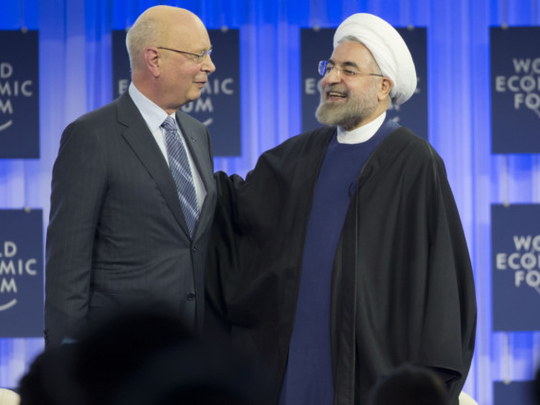
Davos: Iran sees no reason for failure in the nuclear talks with the international community from its side, as President Hassan Rouhani made as strong pitch to rejoin the international community on political and economic level.
Rouhani made a remarkable address at the World Economic Forum at Davos in which he foresaw no problems in coming to an agreement with the P5+1 from Iran’s side, although he expressed fears that the Americans may not have the determination to finalise a deal.
“I do not see any impediment to reaching an agreement with the P5+1. I think that the initial agreement will lead to a full and final agreement, although one possible impediment is a lack of will from other parties [the USA], and it is also possible that they can be pressured to not come to an agreement,” said Rouhani.
He was explicit that Iran does not want nuclear weapons but he repeated a frequent Iranian determination that “Iran will not give up the search for peaceful nuclear technology and we will continue to do this to develop energy, electricity, as well as for medical purposes.
“Iran is pursuing its peaceful nuclear programme and will not accept obstacles. Nuclear weapons have no place in our society. We have no desire for them,” Rouhani said, adding that “Iran has never invaded any state.” He also welcomed what he saw as shift in the US negotiating position when he said that “after 10 years our negotiating partners have recognised Iran’s right to peaceful nuclear programme.”
Commenting on the ongoing talks in Geneva on finding a political solution to the civil war in Syria, Rouhani emphasised the need to stop the humanitarian tragedy, and looking ahead to he emphasised the need to “stop terrorists” gaining in strength, and the need to “push the terrorists out of Syria, because they will spread further” in a clear reference to the dangers of allowing Islamist groups like Al Qaida and Jabhat Al Nusra gain traction in the civil war.
Later Syria needs free and fair elections, since no outside party can decide who should rule Syria, that should be left to the Syrians, said Rouhani. He made no comment on the on-off invitation to Iran to attend the Geneva talks. Rouhani took the opportunity of the Davos meeting to make a clear pitch for Iran to rejoin the international community, in which context he spoke of the importance of Iran’s prudent moderation in guiding his government’s policies.
He was strongly in favour of more inclusive economic policies, even if he phrased it in a more religious manner than most when he said that “The Quran tells us only that which benefits people will do well on Earth”. He explained this by emphasising the importance of achieving better distribution of wealth, pointing out that “the Middle East region is burning, and violence and terror are a fire in society. This fire is fuelled from the hungry and unemployed, and it is necessary to create jobs in order to create security”.
His inclusion of Iran as a player in the global economy was clear when he referred to the recent global crash and said that “the financial crisis showed how we are all in the same boat.” He seemed ready to make a drive for economic reform the heart of his govenrment’s action plan when he said that Iran could be in the world’s Top 10 GDPs in a decade if it got the economy right.
“The groundwork to do this will be at the heart of my presidency,” said Rouhani, adding that “we will overcome all political obstacles on this road”. This new economic determination means that Rouhani seems to be willing to use the drive to improve Iran’s economy as a way to get the political reforms he needs internally and the rehabilitation Iran craves internationally.
Rouhani spoke of “constructive engagement as a pillar of my government’s policy”, referring to “an active foreign policy to achieve economic development. Iran is ready to engage with anyone on issues as wide ranging as environment, trade, humanitarian aid in Syria, and fighting terror”, said Rouhani. He spoke of deepening relations in the Gulf, adding that regional cooperation is vital. He then listed a wide variety of neighbours which included the Gulf states as well as Turkey, Russia, Iraq, Afghanistan, and the Caucasus.
Looking further afield, he foresaw Iran’s previously deep ties with Europe being restored with the implementation of the Geneva talks. He was more circumspect about relations with the US, although he welcomed the fact that Iran and the US are talking, but he added that the US needs to make the leap to understand that the Islamic Republic is there to stay.
“It is important that Iran and US officials are talking and that negotiations are underway, but the US needs to accept Iran. It is important to understand that the Islamic Republic is part of the Iranian search for freedom going back over 100 years and the US needs to accept this,” said Rouhani.












